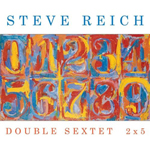|
|
 |
Dusted Reviews
Artist: Steve Reich Album: Double Sextet / 2x5 Label: Nonesuch Review date: Sep. 20, 2010 |

|
|
|
 |
While some artists continually reinvent themselves, Steve Reich is of the sort who opted to stay the course. That’s not to say that he’s a minimalist one-trick pony; his fascination with patterns and interlocking rhythms remains solid, but the grammar and style of later compositions seem to at least explore new terrain.
Take, for example, the two pieces Double Sextet and 2x5. Built into the titles is the idea that both pieces involve doubled ensembles. The composer specifies that when performing the pieces, one group may play against a recording of itself, or two separate groups may play (there would be double the number of musicians in this instance). Reich’s pieces do not privilege recording or live band over the other. Both play equally important roles as part of the music. This idea is not new; the composer has explored this technique in his 1967 Violin Phase, for instance. However, over the decades, Reich’s music has shifted from an emphasis on completing a “gradual process” to using similar patterns in order to create more drama, affecting the cinematic.
The two ensembles performing Reich’s works deserve much credit. The members of eighth blackbird and Bang on Can are highly skilled musicians who would have no problem hammering out a Brahms sonata. At the same time, they also grew up playing and listening to other things too — like rock ‘n’ roll (actually, even their parents probably listened to rock). What makes Reich a great composer is not just that he has good ideas, but that knows he has a whole generation of musicians who grew up on his works. Reich responds actively to those players by synthesizing their musical worlds with his. Those musicians are exactly the ones that Reich needs to properly execute his works, because they know how to blend classical technique with modern precision and a rock-solid sense of groove.
Commissioned by eighth blackbird, the 2009 Pulitzer-winning Double Sextet is scored for two sextets consisting of flute, clarinet, vibraphone, piano, violin and cello. As highly rhythmic lines ricochet off of one another, moods crosscut between scenes in an instant — basically, quintessential Steve Reich. Compared to Double Sextet, 2x5 is slightly more of a leap. He wrote for the electric guitar in 1987’s Electric Counterpoint, but 2x5 enlists the whole rock band (in this case, two electric guitars, piano, bass, and drums — all doubled). Musically, it takes elements directly from rock and funk, reminiscent of Frank Zappa’s work. Yet, those borrowed riffs undergo the same meticulous treatment of material that underlies all of Reich’s work. In many ways, the album is about Steve Reich refining and exploring what has worked so long, and so well, for him.
By Miki Kaneda
|







